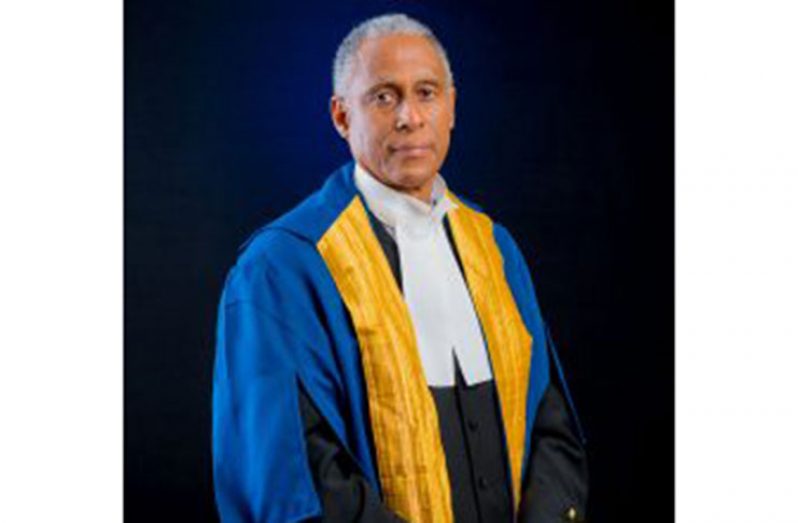PRESIDENT of the Caribbean Court of Justice (CCJ) Adrian Saunders, after hearing two days of intense oral arguments, said the Court will announce a date for decision on the consolidated appeals on the Guyana Court of Appeal’s decision to invalidate the vote of no-confidence against the Guyana Government.
He said based on the decision of the court, the Guyana Elections Commission (GECOM’s) Attorney Stanley Marcus may be asked to reappear before the CCJ on behalf of the elections commission.

“It may be necessary for us to hear further submissions from GECOM, but of course we don’t want to hear those submissions now,” the CCJ President told the parties in the consolidated appeals. It was explained that once the CCJ arrives at its decision, a date would be given for the ruling. He reiterated that based on the decision, GECOM may be asked to make further submissions. If the CCJ overturns the decision of the Court of Appeal, early elections would be required in keeping with Article 106 (7) of the Constitution, which provides for elections to be held within three months following the defeat of a government in the National Assembly.
The decision, Justice Saunders indicated, would not be ready in the coming week. “We wouldn’t be able to give a decision next week,” the CCJ President said in response to an indication by Marcus, a senior counsel, that he would be out of the jurisdiction in the coming days. Justice Saunders presided over the hearing of the three appeals, along with Justices Jacob Wit, David Hayton, Winston Anderson and Maureen Rajnauth-Lee. Those appeals are: Christopher Ram vs The Attorney General, the Leader of the Opposition, Joseph Harmon and the Guyana Elections Commission; Bharrat Jagdeo vs The Attorney General, the Speaker of the National Assembly, Joseph Harmon and the Guyana Elections Commission; and Charrandass Persaud vs Compton Reid, the Speaker of the National Assembly, the Attorney General, Bharrat Jagdeo, Joseph Harmon and the Guyana Elections Commission.
On Thursday, when Marcus addressed the court, he indicated that GECOM would be incapable of conducting General and Regional Elections before November 2019, explaining that the Official List of Voters is in the process of being revised after a decade, and that process must be completed.
Also on Thursday, Attorney General Basil Williams told the judges that in the event the court rules that early elections are required, funding will be provided.
“The President of Guyana has already given that commitment, and he has given that commitment to the nation, and he has given it specifically to GECOM when they met with the President,” the attorney general told the court.
In rebutting the submissions made by Senior Counsel Marcus, Sanjeev Datadin on Friday told the court that the National Registration Act provides for continuous registration across the 10 administrative regions.
“There is nowhere in the law that house-to-house registration has a statutory underpinning. It used to be there, and my respectful submission is, it used to be there, it was removed for a reason,” Datadin submitted to the court.

But Datadin quickly accepted that the Elections Commission can delay the holding of elections if it is not capable of doing so. “You do agree though, that GECOM has significant discretion,” Justice Anderson asked, and in response, the attorney said: “The discretion has to be exercised in light of where we are now and what is going on now.” He nonetheless, conceded that GECOM can postpone elections in keeping with Article 162 (2) of the Constitution. Datadin is representing Charrandass Persaud, the Member of Parliament who was recalled after he betrayed his government by supporting an opposition-sponsored no-confidence motion.
That Constitution states: “Notwithstanding anything to the contrary in the Constitution, if the Elections Commission is satisfied that the holding of an election pursuant to the provisions of paragraph (2) of Article 60 on the day appointed therefor would be attended, either generally or in a particular area, by danger or serious hardship it may, after consultation with the Prime Minister and the Leader of the Opposition, by notice published in the Gazette – (a) postpone the holding of the election to a day specified in the notice; or (b) postponed the voting in any area specified in the notice to a day so specified.”
But Kamal Ramkarran, the attorney representing Christopher Ram, told the court that the GECOM can delay elections under normal circumstances.
“It cannot be applicable, because there is no date for it to be postponed. But even if there were, the exercise of this power must be in the most limited,” he posited, while adding that “this power must be subjected to very high standards of proof and it has to be objectively determined.”
Ramkarran submitted that powers laid out in Article 162 (2) of the Constitution is not be invoked unless in dire circumstances which are clear to “all right-minded citizens.” “It cannot be postponed unless everybody agrees that there is serious hardship,” he posited. According to him, the multibillion subvention made available through the 2019 National Budget could have been used by the Elections Commission to facilitate elections, once Article 106 (7) was activated.




.jpg)









